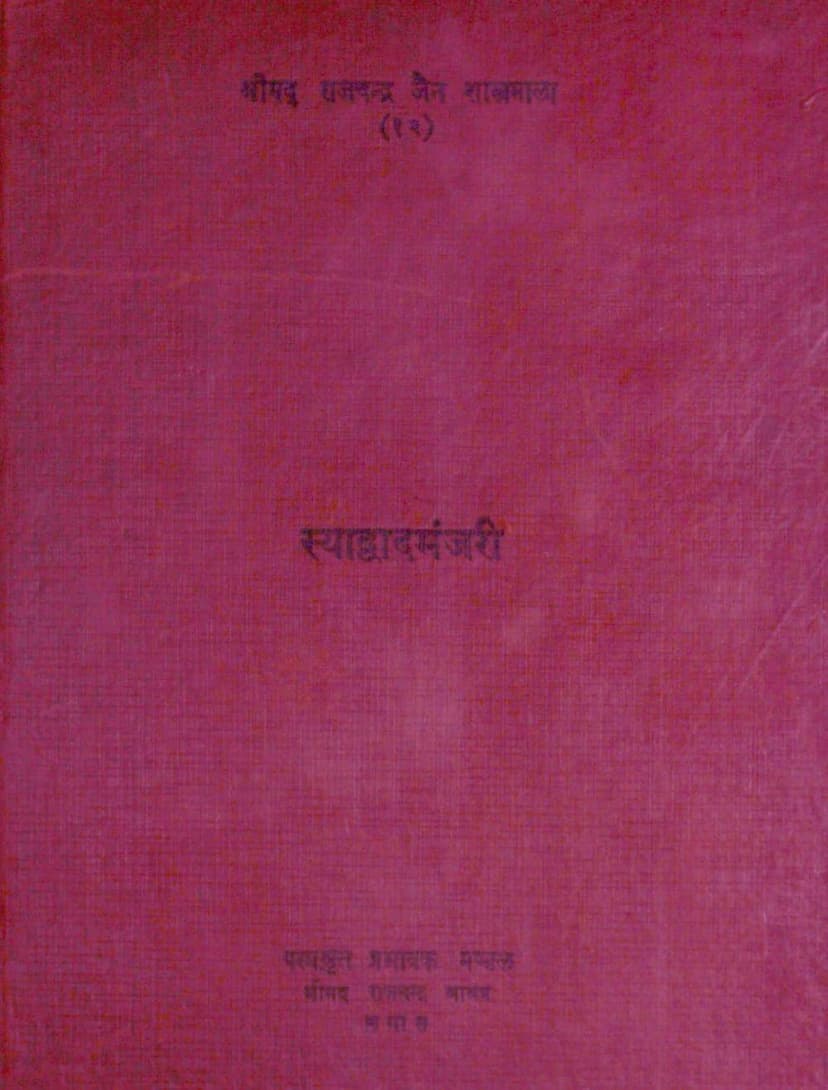Syadvada Manjari
Added to library: September 2, 2025

Summary
Here's a comprehensive summary in English of the Jain text "Syadvada Manjari" by Jagdishchandra Jain, based on the provided text, focusing on its key aspects:
Book Title: Syadvada Manjari Author: Jagdishch1andra Jain Publisher: Paramshrut Prabhavak Mandal Core Subject: The book is a Hindi translation and commentary on the Anyayogavyavachedadvatrinshikastotra (a 32-verse hymn) composed by the renowned Jain Acharya Hemachandra. The primary purpose of the text is to elucidate and establish the philosophy of Syadvada (the doctrine of "maybe" or conditional predication) and Anekanavada (the doctrine of manifold aspects) within Jainism.
Context and Background:
- The Syadvada Manjari is a detailed commentary by Acharya Mallishena on Hemachandra Acharya's Anyayogavyavachedadvatrinshikastotra.
- Hemachandra Acharya (11th-12th century CE) was a highly influential Jain scholar, poet, and philosopher. His hymn was specifically written to demonstrate the superiority and comprehensiveness of Syadvada, particularly in contrast to other philosophical systems.
- The Syadvada Manjari aims to prove the validity of Syadvada by analyzing and refuting the core tenets of various other Indian philosophical schools, including Nyaya-Vaisheshika, Mimamsa, Vedanta, Sankhya, and Buddhism.
- The edition discussed here is a revised and expanded Hindi translation and compilation by Dr. Jagdishchandra Jain, building upon previous editions and incorporating extensive research. It also includes Hemachandra's Ayogavyavachedikastotra and comprehensive appendices on various philosophical schools.
Key Philosophical Concepts Elucidated:
-
Syadvada (The Doctrine of "Maybe"): The central theme of the book is the exposition of Syadvada. It is presented as the Jain approach to understanding reality, acknowledging that every assertion about an object is only partially true and depends on the particular perspective (naya) from which it is viewed. Syadvada emphasizes the conditional nature of truth, using the prefix "Syat" (maybe) to qualify judgments, thereby avoiding dogmatic claims and respecting multiple viewpoints.
-
Anekanlavada (Multi-faceted Reality): Syadvada is intrinsically linked to Anekanlavada, the principle that reality is multi-faceted and possesses infinite attributes. The book explains how Syadvada allows for the description of these multiple facets without contradiction, demonstrating that seemingly opposite qualities (like permanence and change, existence and non-existence) can coexist in a single object when viewed from different perspectives.
-
Critique of Other Philosophical Systems: A significant portion of the Syadvada Manjari is dedicated to refuting the philosophical positions of other Indian schools. Mallishena, through his commentary, systematically addresses and critiques:
- Nyaya-Vaisheshika: Criticizes their views on categories, God as the creator, the nature of general and particular, the reality of samavaya (inherence), and the path to liberation through knowledge of certain logical concepts.
- Mimamsa: Refutes their reliance on Vedic authority, their views on the necessity of Vedic rituals (including animal sacrifice), and their understanding of knowledge.
- Vedanta: Critiques the Advaita Vedanta concept of Maya and the ultimate reality of Brahman.
- Sankhya: Debunks their dualistic cosmology of Purusha and Prakriti, their theory of causation (Satkaryavada), and their understanding of liberation.
- Buddhism: Addresses various schools of Buddhism, refuting their doctrines of momentariness (Kshanavada), egolessness (Anatmavada), the non-existence of reality (Shunyavada), and the nature of consciousness (Vijnanavada).
- Chavaka (Materialism): Refutes their materialistic philosophy, which relies solely on perception and denies the existence of the soul, afterlife, and other metaphysical entities.
-
Defense of Jain Tenets: In refuting other philosophies, Mallishena firmly establishes and defends the core Jain doctrines, including:
- The nature of soul (Jiva) and its attributes.
- The concept of substance (Dravya) and its modes (Paryaya).
- The validity of multiple valid means of knowledge (Pramanas) and perspectives (Nayas).
- The doctrine of karma and its role in liberation.
- The possibility of omniscience (Kevala Jnana) and the existence of omniscient beings (Sarvajna).
- The principles of Anekantavada and Syadvada as the ultimate truth-finding methodology.
-
Structure and Content:
- The book begins with invocations and introductory remarks about the significance of Hemachandra's hymn.
- It then proceeds to analyze each verse of Hemachandra's Anyayogavyavachedadvatrinshika, providing a detailed commentary that systematically refutes opposing philosophical views and establishes Jain principles.
- The commentary is rich with logical arguments, examples, and critiques of various philosophical schools, demonstrating Mallishena's profound understanding of Indian philosophy.
- The translation by Jagdishchandra Jain is noted for its clarity, simplicity, and the inclusion of helpful notes and extensive appendices which provide detailed context on Jain terminology and concepts from other philosophical traditions.
Significance: The Syadvada Manjari is a monumental work in Jain philosophy, serving as a classic defense of Syadvada and Anekantavada. It showcases the logical rigor and intellectual depth of Jainism, presenting it not as a narrow dogma but as a nuanced and comprehensive understanding of reality capable of encompassing and reconciling diverse perspectives. The translation and edition by Jagdishchandra Jain make this vital text accessible to a wider audience, contributing significantly to the study of Indian philosophy.